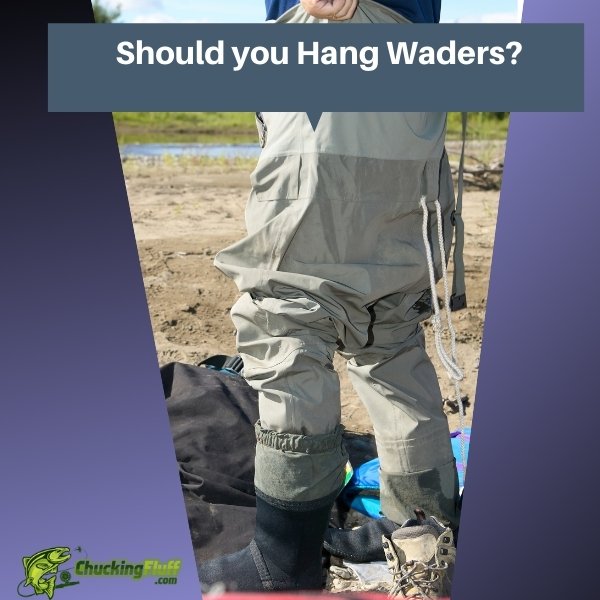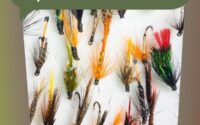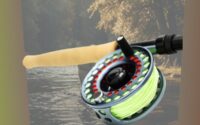| Disclosure: Just to be open and honest the buttons and links you click on in the website will in most cases take you to another website where you can purchase the products I am reviewing. As an Amazon Associate I earn from qualifying purchases. |
Should You Hang Waders? Making a Decision for Proper Care

Wader storage is among the determinants of performance and longevity.
Whether they’re the cheapest in the market or cost you your lifetime’s fortune, proper care, maintenance, and storage count.
Should you hang waders after use?
Yes, you can hang your waders?
Sure, you can hang your waders after cleaning them to dry completely before storage.
And for storage, it is safe to lay them flat or hang them in a clutter-free closet.
How you hang them could affect its condition at the area it is hung.
Manufacturers like Simms sew hang loops in the back of waders to use instead of using suspenders or the chest hem on a nail or hook.
Quick Post Navigation
Should You Hang Waders?
Hanging waders is a thing, in fact, it is the best storage method for short durations.
If your waders don’t come with a hang loop, use a hanger, but ensure it is in tip-top condition first.
Those with velvet or fabric covering are the best.
Metallic hangers with uneven surfaces can be risky to use because any sharp areas can get through your waders and affected areas could cause wader leakage.
Let’s see some instances when you can hang waders and the correct way to do it for optimum performance and longevity.
After Every Use
Here, we are talking about hanging your waders after each use if you are constantly fishing in the week.
Hanging them correctly ensures they dry completely and prolong their life.
Otherwise, it could be the reason you are feeling wet when in waders yet they aren’t leaking.
Waders are performance gear but leaving them wet and damp in your car trunk or garage floor can lead to the growth of mildew.
Mildew breaks down wader material and these are almost hard to repair, especially if it affects most parts of your gear.
Hanging your waders after each use ensures proper drying in and out, prevention of material breakdown, and funk when you wear them next.
To Dry Out Condensation Moisture
There are days when you want to be out of the water but still enjoy the sport away from mud, splashes, and direct water contact.
Slow boat fishing and casting from the steps or banks allow for ‘dry fishing’.
If the temperatures are high or you naturally sweat more regardless of the time, you will notice condensation moisture on your feet, legs, ankles, and crotch.
NOTE: We are talking about heavy perspirations that can cause dampness or wetness and not leakage from wader punctures, boat and gear splashes, or gaping seams.
You want to hang your waders inside out to dry properly.
If you experience this in winter, hang your waders right side out near a working dehumidifier or in a furnace room to dry in case you need them urgently.
Otherwise, a cool and dry area with enough airflow will do.
Drying Washed Waders
Waders are very notorious for retaining a somewhat unpleasant odor even after drying and you wouldn’t want this.
The problem often results from folding waders while they dry.
Ensure you hang your waders after washing to drip-dry first before using a blower if you want them pretty soon.
Using a blower is a creative approach but works like leaving the waders out on a cloth line to dry naturally.
The blower only gives a triple effect – it is like air drying the gear on steroids.
The method is safer than using a tumble dryer because the latter has a forceful mechanical action that could damage your fabric.
Hang your waders by the loop or using a wrapped hanger and use a blower to drive off excess humidity while maintaining the state of your gear.
A furnace room works effectively on waders that are not too wet.
If you don’t have one, the warmest room in your house will do.
Flip your waders, open their zippers, and use a hanger to position them in a toasty spot.
NOTE: NEVER place waders close to a heat source since you risk burning them.
This method is cost-friendly for frequent anglers because it doesn’t need special arrangements, and neither does it cost anything.
Should You Hang Waders? – FAQs
There is so much back and forth about hanging waders, especially on angler forums.
Here are some questions and answers to help you understand wader care and whether you should hang them.
Q) How Can I Hang Waders on a Cloth Line?
A) If your cloth line is at lintel level or higher, use a pair of smooth surfaced hangers to hang them.
This allows for drying on the front and back sides at the same time.
But if you are using a cloth drying rack, hang it by the waist – allow the upper section of the waders to go over the rack.
You’ll have to switch positions from time to time to allow for even drying.
Q) Does Hanging Waders Damage Them?
A) Hanging waders the right way doesn’t damage them, instead it prolongs their life if we factor in storage only.
But, if you do it wrongly by hanging the gear on a nail if it has no loop or by its suspenders, you risk ruining them.
Q) Is My Closet the Safest Place to Hang Waders?
A) Your closet is an area you are always frequenting and might not be ideal for wader storage.
However, if you have a spare one with seasonal clothes you hardly wear, hang your waders there.
Conclusion
Should you hang waders?
Hanging waders is one of the best ways to store this piece of gear but you have to do it correctly.
Use the hanging loop at the back of your gear to hang them in a cool and dry place free from traffic and potential damage.
If your waders have no loop, a hanger with smooth surfaces should do.
Hang them like you would a pair of trousers and avoid doing it with their suspenders.
You want to ensure your gear is in pristine condition even when in storage.
Otherwise, you will compromise its state, performance, and overall longevity.


